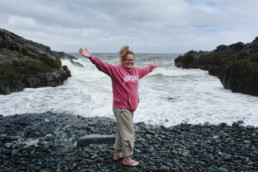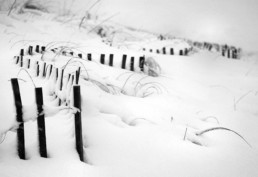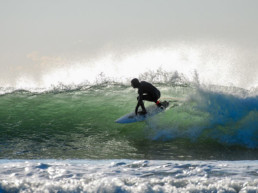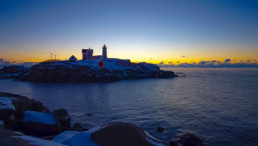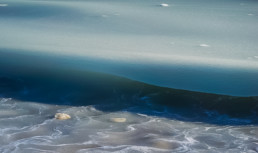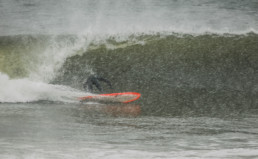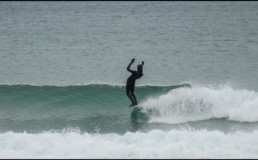To listen to the interview, scroll to the Player at the bottom of the page.
"You're always evolving but at some point you have to discover your true essence, who you are. I’m Maureen and I'm a surfer and that's who I have always been.
And for most of us as older transitioners, who’ve been through what we've been through, we don't want to see younger kids struggle the way we did. We want to allow the younger trans population to experience themselves early. But for most of us older transitioners, it’s, you reach a point where it's transition or die."
~ Maureen McNamara
Show Notes
Maureen McNamara’s article about being a trans surfer in The Inertia
One of Maureen’s surf style heroes: Leah Dawson
The first mainstream surf documentary: The Endless Summer
A brief article in The Inertia putting The Endless Summer in historical context
Resources for transgender youth
Interview Transcript
INTRODUCTION
My name is Maia Dery.
The Waves to Wisdom interviews are the result of an exploration into a world I discovered when I learned to surf at mid-life.
Some of these conversations aren’t necessarily with people who we would instantly recognize as leaders but they are all leading us in a direction I instinctively followed and have benefitted tremendously in the process. Some of them don’t have huge audiences, but they are living very large lives.
To me, these people all seem to have wisdom practices centered in their relationship to the more-than-human world, to what we usually think of as “nature.”
Surfing proved first revelatory, then revolutionary in my life. I thought I was creative, thought I knew and loved water, thought I took care of my body. But when I entered the world of surfing and waves, when I started to ritualistically return to a literal edge, I realized my vision for my life had been hampered by some artificial barriers.
Slowly, with each wave and wipeout, those barriers in my brain, heart, and body began to dissolve.
I began to wonder, what if we all had a nature based practice that cracked us open? Made us more creative? Allowed us to reliably let go with the abandon of play? Of unbridled joy? What if we all practiced vulnerability, risk and failure on a daily basis and they were fun? Wouldn’t it make our lives better? Wouldn’t it lead us to the places it feels like, in this moment of planetary peril, we need to go?
Whether you find full bodied and big hearted connection through waves or walking or digging in the dirt, I hope you find these conversations useful in your own journey of re-inhabiting your life with renewed joy, deep engagement, and increasing wisdom.
Maureen McNamara:
You’re always evolving but at some point you have to discover your true essence, who you are. I’m Maureen and I’m a surfer and that’s who I have always been.
And for most of us as older transitioners, who’ve been through what we’ve been through, we don’t want to see younger kids struggle the way we did. We want to allow the younger trans population to experience themselves early. But for most of us older transitioners, it’s, you reach a point where it’s transition or die.
Maia: Surfer, photographer, and healthcare worker Maureen McNamara and I spent a couple of very chilly days exploring the rocky, intricate, beautiful Maine coastline. Everything my body was experiencing from the winter wetsuit to the big fat white snowflakes falling in the dark water, grayed by a heavy clouded sky, all of this was a total nonsequitor to what my calendar said, that we were well into the spring of the year. As strange and alien as these days felt to me Maureen was in intimately familiar territory. Every time we drove around a cove and she told me what to expect, I was struck by how her exhaustive knowledge of the place was both product and producer of her nearly lifelong surfing practice. As is the case with so many of us who are dependent on activity in the more than human world, Maureen credits her surfing habit with saving her life. What I find unique and inspiring was the role surfing plays and continues to play as she recounts the story of how, midway through the journey of our life, Maureen found the strength and courage to finally confront the fear that had kept her from honoring her fundamental nature.
Welcome to Waves to Wisdom.
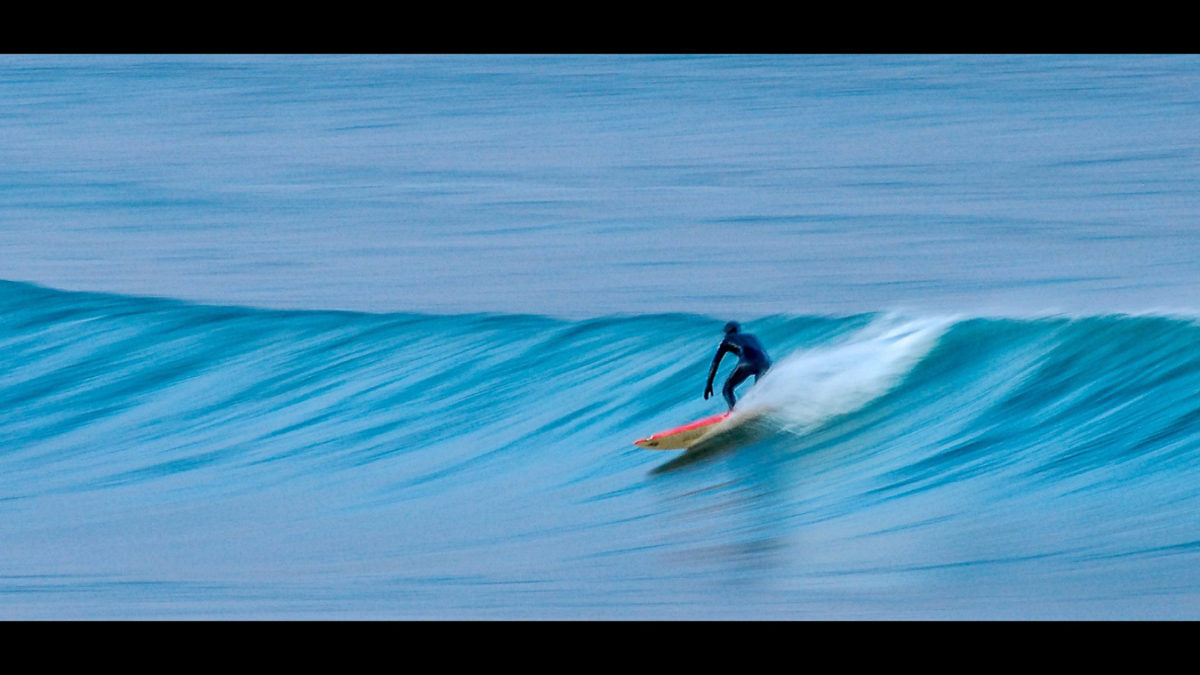
Maia: We usually start— if you tell us your name your age and how long you been surfing
Mo: Well my name is Maureen McNamara my nickname is Mo people call me either Maureen or Mo. What was the other question? Ah, my age 60 and I’ve been surfing for 45 years now.
Maia: 45 years, ok and we just had really quite a spectacular surf. Will you talk a little bit about where we are and what we just did?
Mo: Well this is Gooch’s beach in Kennebunkport, Maine.
Maia: And it’s, it’s early May and snowing. Actually, I think it just stopped snowing but it’s it’s not warm.
Mo: Well as I said a few minutes ago it’s a little bit colder than normal this time year but it’s not unheard of to have this sort of weather in May in Maine.
Maia: Michael Coleman, who was the subject of a podcast, recommended that I interview you. And he thought that you were a particularly inspiring and courageous surfer. Will you tell us a little about your background?
Mo: Well I started surfing in 1974. We used to vacation in Ogunquit. My family would rent a cottage right on the Ogunquit River and we paddled across or walk across at low tide to the beach and go surfing every day, all day. And mostly it was at summers at first because at the time we are living in Washington, DC. My dad was stationed at the Pentagon. And we move back into this area when my dad retired and that’s when I started surfing year-round. It’s quite a bit different in the off-season as opposed to the summer season. The surf is much better but it’s also very cold as you discovered today.
Maia: Yes! Talk a little bit about your relationship with your surfboards
Mo: Well, I told you yesterday how I had this instant reaction after seeing The Endless Summer which is what got me wanting to surf when I was very young— probably seven or eight years old, I can’t remember exactly. And it was a similar, similar situation with shaping surfboards. I surfed that first year, that summer of ’74, and I just got it into my head all through the winter reading Surfer Magazine, Surfing Magazine were the two big magazines at the time. I just, I don’t know what it was, I just had to make a board. I wanted to make my own board.
And so the next summer we came back, in ’75 and I convinced the local surf shop owner to order me a blank and some resin and supplies. He thought I was crazy because nobody did that around here. And I bought a little book that detailed the process from start to finish. And I went out into the garage, and I built my first surfboard. Dripped resin all over the floor, which is probably still there on the rented cottage that we were at, had a blue tint. I made all sorts of mistakes with the glassing but the shape came out pretty nice and I been making my boards ever since. It was just something I was drawn to. I guess, in a way I’ve always been independent and I like to do things myself even though I stumble and bumble my way through it. I like to do things independently and learn things. I take the hard way, the long way but I think it’s part of the process of learning, you know, something new that attracts me.
Maia: Yes, anybody who surfs year-round in Maine clearly is familiar with the hard way.
Mo: I had a natural eye for shaping. There’s so much technical detail that goes into it and it took me a long time, a lot of trial and error. Back before the internet we can have all the information that you have now. And once information became available on the internet, probably 20 years ago, I discovered all the mistakes I’d been making and how to correct them. Which was another part of the learning process. And now I’m pretty happy with the way my boards turn out. And I know what works, especially in this area. I know what works and what doesn’t and I have very strong opinions about it at this stage of my life. I, you know, will often kind of cringe when I see the boards people are riding because to my opinion they’re not really suited to the conditions and/or the ability levels of a lot of the surfers that I see.
Maia: Interesting, so it’s a different kind of local knowledge then that goes with the technical know-how.
Mo: Yeah, you know, we went through real stagnant period in the 90s where everybody was trying to ride the same boards Kelly Slater was riding. And it didn’t work for most surfers because 99.9% of the surfers are not Kelly Slater or anything approaching his ability. People were riding wrong boards— too short, too thin, too narrow. And now it’s it’s kind of cool to be a surfboard, designer, shaper, builder because we’re back into that free expression, experimental mode which coming right out of the longboard era and into the short board revolution, there was a lot of experimentation and for some reason people got away from that, mostly when competition surfing came in in the mid-70s late 70s.
And then it all became contest oriented and everybody’s trying to build boards for contest surfing and surf in that contest way and I never was aligned with that. For me surfing is not about competition.
Maia: Okay, so the driving hypothesis of these interviews is my experience that, for a certain subset of surfers, that surfing helps us make sense of our lives that it really grounds us and gives us a kind of a reason for being, helps us make sense of adversity and challenges, and the difficulties that come into life. Do you think I’m on to something? Is that a reasonable hypothesis?
Mo: Definitely, definitely. I listened to your interview with Mike last night and I was moved by it in certain places. It was nice memories of an old friend that I’d lost touch with but also some of the things that you talked about with him and his wife resonated and definitely you are onto something because I’ve always felt that way.
I think I mentioned to you yesterday how I grew up in an environment, in a family who kind of trivialized surfing and my involvement with it. Surfing can be whatever you want to be. It can be as little or as much as you want it to be. For me like I said I had that visceral connection with that the first time I saw The Endless Summer when I was 7-8 years old. I knew, I looked at the screen I said “I have to do that! I have to do that!” and it took me a few more years before I was able to buy my own board ‘ cause my parents certainly weren’t going to buy boards for us. And everything I did met resistance at every step of the way. And to me it was just so powerful connection that I had with the the ocean, the sensations of riding a wave, everything encompassing it, that I knew I was I was onto something and I think surfing— you live in the moment with surfing. And you have to. I mean we were just out there now and you caught a wave right off and it was, you know, kind of not a death-defying wave. It was kind of a mellow wave and you had a nice introduction to The Bunk and Maine surfing. And then a little bit later a set came in and caught both of us and we took few waves on the head…
Maia: A few very cold waves…
Mo: And that’s what surfing is you know? It will humble you. It will excite you. It’ll invigorate you. It will rejuvenate you. But sometimes you get to get a few waves on the head and you get very cold and you get tumbled under water. It, it gives you a connection to, not only the natural world, but I think our spiritual, soulful world that too many of us try and t disconnect from, I think. We spent a lot of time pursuing things that aren’t really important.
You know, I work in a nursing facility as a nursing assistant and dealing with people who are you know, at end-of-life and they have lots of regrets and things that they wish they had done. And I always felt like, why do we spend our time pursuing things that aren’t really that important? If you want to do things get out there and do them, it doesn’t have to be surfing. There’s many other things that you can do but I’m always a firm believer in pursuing once passions. First find a passion and then pursue it, you know?
I was telling my wife Jess last night that, it’s a different way of life. All the surfers I know, they structure their whole life, their whole day around prospects for surf or if there is surf they’re going surfing. And it’s not that they’re all a bunch of lazy dropouts. But they’ve structured their life so they have time every day to go paddle out and catch a wave or two and experience everything that surfing has to offer. Surfers, you go by the rhythm of the tides and winds and it gives you that tune into the natural, the natural order of things rather than the human, man-made order..
Maia: It’s one of things that I love most about surfing is that the ocean is always in charge, in charge of your schedule, in charge of what kind of time you have, and how many rides you get, all of it.
Mo: Yeah, I, you know, I mentioned yesterday about how I feel in our culture, our Western culture specifically, that we’ve gotten away— We have roots in that much like Eastern cultures or, you know, indigenous cultures of North America, South America, Australia. And for some reason in Western culture we seem to have disconnected and gotten away from that, even though we have roots there as well, as all peoples do I think.
Maia: You talked a little bit about your Celtic and [yeah] Scandinavian heritage?
Mo: Well it, you know, I’m part Irish, part Swedish and, you know just knowing the little bit that I do about my my heritage, my ancestry, I know that there’s that same connection to the land, the earth, the sea, the air and I’m shivering and hyperventilating a little bit right now because I’m still chilly but, yeah, we have a connection that we try and divorce ourselves from it. And we insulate ourselves in buildings and in cars that have heat and, you know, we don’t experience being out in the Maine water when it’s 40° water and 40° air and it’s, it’s cold and windy. And is that really the essence of what what our lives are supposed to be? You know, it’s an insulation and it’s, it’s not real. And, you know, I struggled a long time with people telling me that surfing wasn’t real and I’m like “It doesn’t get any more real than that!” And that’s the essence I think, that’s always been the essence to me.
Maia: It’s one of the things I love the most about surfing is that all biological life in some ways is a collaboration with water. Life doesn’t work without water as its fundamental material and we, most of the time in this culture don’t think about that. But when you’re surfing you are in a conscious collaboration with water and water is always in charge [yes] and I love the way it, it reminds me, helps me remember, as opposed to feeling dismembered, helps me remember how much my life is, is literally this continuation of other lives. I am part of the stream of life and of water that just keeps cycling around. It really is a powerful, it’s a powerful metaphor and fact at the same time.
Mo: Yeah, you know I can remember days surfing in the middle the winter and I look at the bluffs and the snow on the bluffs and snow pellets coming down and it’s cold, and it’s windy, and you’re out there. Maybe you’re out there on on a solo session and I’m like I’m living an experience that most people will never experience and how tragic is that? That they don’t they don’t get this essence of our connection to our natural world and in this case specifically the ocean. We have this experience called life and we’re here for a very short time. Working in the, in the the healthcare field that I do it’s driven home every every shift I pull— how limited and how precious our time is. I just turned 60 years old this year and I look back and my life was an eye blink. And I’m, I’m closer to the end than I am to the beginning and I feel blessed to have had surfing as a passion because I think it’s taught me so much. It’s given me that spiritual, soulful connection to what the life experience is. I’m not rich. I’m not… I haven’t traveled much like a lot of my surfing friends will travel to surf. I haven’t had the fortune to do that.
I used to lament and become very depressed that I would watch all my friends going off to exotic locations: Puerto Rico, Costa Rica, Australia, Sri Lanka all these places all around the world which has always been some of my dream. But I haven’t had the opportunity for various reasons and yet I am intimately connected to this little corner of the world. I know every grain of sand and rock and pebble and turn of the coastline and, you know, in this area from Fortune’s Rock to Hampton Beach down in New Hampshire and this is my little corner of the universe and I know it as well as a Perry Winkle crawling around a tide pool knows that a little tide pool and it may be a very small little tide pool but in that small little world there’s still so much to see.
Maia: So much! Especially in this area, there’s so much variety in the coast here.
Mo: Yeah and it’s constantly changing, that’s another aspect of it. You know what you see now is not what you see in February. Yes, it was cold today but there’s a whole another level of cold that, you know [that I have no desire to experience] is not apparent today. I told you about surfing on a day one the water was 36° and the air was down to single digits and the windchill was in negative numbers. And I sat there watching it and the waves were just flawless at the River Mouth, my home break. And I watched for about an hour and I kept thinking how cold it was and I would be out by myself. And then I finally had to say, “You have to go out I mean you have to experience that experience of being in that cold, of being alone out there!”
And I did, I paddled out. By the time I got out there was a couple other surfers suiting up to go out so I wasn’t completely alone. But for the first wave I caught I was by myself. And I just had this flawless wave that went on for about 2 or 300 yards, it just kept going and I had that experience. And I only caught three waves and every one of them was, you know, one of the best three waves of my life. I don’t know I’ve lived with cold my whole life, I think that maybe there’s something in my DNA being Irish, Swedish, Scandinavian that maybe it’s in my blood, maybe the cold is in my blood? The only time I ever spent time in a warmer place I lived in Florida for a short time and had the worst sunburns of my life down there and I’m like, “This isn’t much fun!” And Florida is like loaded with sharks and I’m not fond of sharks that’s a little secret by the way.
As much as I’m connected and love the ocean— I didn’t tell you this yet— I’m scared to death of the ocean. I struggled down on Nantucket because there’s white sharks around there because there’s a huge seal population. I did not like surfing alone there. I do surf alone here. But I also had a near drowning experience back in the 80s down in New Hampshire on a big winter day and those two things really reinforced my fear of the ocean and I’m not always comfortable in either solo sessions or bigger sessions because of those two experiences. But I still force myself out there.
Maia: I really understand that. I’m a pretty fearful person by nature and one of the things that I love that surfing does for me is, is force me to face my fears just about every single wave I take off on.
Mo: Yeah it’s, you know, this other aspect of my life— I don’t know if you want to get into that but [absolutely] if— I always tell people if I could sum up my life with a single word it would be…
Maia: You are writing in the steamed up window “fear”
Mo: I lived for 50 years in fear and I let it rule my life. And in some ways I could say that I, I’ve missed out a lot on what my life could have and should have been. Looking back now I wouldn’t change any of it because that was the experience I was meant to live.
But fear can paralyze you. You know they always talk about when animals, including humans, are confronted with a dangerous situation it’s the fight or flight scenario. You either fight or you run. But there’s a third one that they don’t always talk about and that’s, you become paralyzed. I did that for 50 years of my life. And in a lot of ways even with surfing I have done that. I got into photography originally because I was supposed to go on surf trip, my first surf trip to Barbados with my brothers and some friends and one by one they all bailed. And rather than go by myself because I was fearful of going by myself on a surf trip to an unknown place, I used the money that I’d saved and bought some camera equipment and that’s what started me on photography [interesting]. And as a consequence I never went to Barbados and I never went anywhere else of any real surfing consequence but you know that was an aspect of fear that I dealt with.
Maia: You take some awesome pictures!
Mo: I try.
Maia: Do you want to talk about down why it was that he lived in fear for 50 years
Maureen: Yeah I’m, I’m transgender and I lived for the first 50 years in another mode, so to speak, which wasn’t me, was not my true self. And I lived for 25 years in a marriage that was doomed from the start. I got married at that time, I was 22-23 years old, I was 22 and turned 23 a couple of weeks later, because I thought it was what I was supposed to do and again it’s that conformity, that pressure to to live the life that everybody expects you to live. So I got married and had children we had three kids. I went through the whole suburban life I continued to surf which really probably saved my life because from a very early age— probably, you know, around the same time I saw the Endless Summer at seven or eight years old— I couldn’t really put a finger on what was wrong with me but I knew something was wrong, something wasn’t right. And you know I developed various passions to distract myself, to not deal with it because of that fear.
What if people find out? What will my family say? What, you know, what will people do? Back then it was very difficult.
Talking to a lot of my trans friends now, a lot of them went through some horrific experiences. I have one friend who was even put in an insane asylum for a time. [wow] And, you know, people were beaten, murdered, certainly made fun of. There’s a very high suicide rate and that’s what I lived with on a daily basis from the time I was not even 10 years old, I dealt with that. These feelings of “I just want to end it,” you know? “This is horrible, I just don’t want to live anymore.” And I dealt with that right up until I was out of that first marriage and I finally confronted myself, came out to myself so to speak. I had known it all along and I finally, you know, later on in my teens I discovered what and who I was but didn’t want to face it so hid it, was completely closeted and the only thing that kept me going were my two passions: surfing and writing.
And when my marriage fell apart I started doing some research on the internet, again the internet comes to the rescue, and I confronted myself and I was in therapy already seeing a family counselor and I came out to her. She was the first person I came out to and I got all cotton-mouthed and, you know, she was the first person in 50 years of my life, well I was maybe 48 at the time, that I’d mentioned this aspect of myself and the thing I discovered when I came out to her was a bolt of lightning didn’t come down to strike me dead on the spot. The world did not end, my existence did not end.
And she referred me to a gender therapist which is part of the protocols, the standards of care that’s required to transition. And you have to go to therapy then you have to get a referral from the therapist to get hormones. And then you have to live for at least a year before you can get a referral from not only that therapist but a second therapist, one of them has to be PhD therapist to get a referral for surgery. And once that the egg was broken and I emerged from the shell, I still had a long way to go before I became the full chicken, so to speak, to follow that metaphor, I’m famous for mixing my metaphors but I figured I’d stick with that one.
But yeah so, without surfing I don’t think I would be here. I used to wake up every single day, “What am I getting up for today? Why am I living today? Oh, I gotta coach soccer practice. The kids are counting on me. I gotta go. Okay so I won’t kill myself today.”
And this was a daily occurrence I would spend you know a 1/2 an hour, hour in bed just trying to will myself to get out of bed— this is more towards the end of my first marriage. I think maybe there was some residual guilt and shame that I was brought up in a Catholic household and even though I didn’t follow the church anymore they put that stuff in your head from birth and it’s a brainwashing of sorts in my opinion. I bought into it all when I was young and then I saw the hypocrisies inherent in what was being said what was actually being practiced by too many. And so I turned away from it but I still I think it was that residual fear that or maybe I will go to help, you know? Surfing kept me going and mostly it was a distraction. When I was in the water, like I said, you’re in the moment. You don’t have time for anything else. You have to be present in that moment and put everything else out of your mind and that’s, that’s what got me through and I would just get away and distract myself and it was a constant struggle to distract myself from the the inner self that was trying to emerge.
And I had an epiphany coming home from a good surf session. I actually wrote an article about it in, an essay about it in The Inertia, which is a surfing webzine. I used to have these feelings in my head that “I need to be a girl. I need to be a girl.” And I was out the water one day and I caught this amazing wave and I paddled back to the line-up and I sat there waiting for the next set and I’m like “See that’s all I need! I don’t need to be a girl. That’s all I need in life is just to catch one of those waves every once in awhile and that’s good enough for me!” And as I was driving home that day it suddenly occurred to me. I came over the crest of the hill and the sun was coming in my face the sun was setting and I’m like, wait a minute… if in that moment of ultimate euphoria and glorious, you know, adrenaline rush from that one wave you’re still having that thought in your head then that’s not all you need .
Maia: It’s a powerful thought if it’s intruding into your surfing bliss.
Mo: At the highest moment [absolutely] it was still there. And so I knew right then. It was still a few more years after that before I finally got past the fear and it was hard. You know, one of the things my therapist told me early on, “You have to be prepared to lose everything.” and I was like “Oh Yeah,” and she says, “No, I mean everything.”
And at the time she said it didn’t really resonate with me but over, over the years during and after transition it’s like yeah I lost everything. But like somebody who’s depressed and I was clinically depressed and suicidally depressed, a lot of times when you’re depressed to that level it’s almost like a cloak of comfort that you can pull around yourself and like “Okay I’m just gonna sit here in my depression and that’s what I feel comfortable with and it’s my old soft shoe and even though I hate it and it smells and it’s uncomfortable it’s still comfortable at the same time and that’s what you live with and you’re afraid, once again fear, to to give that up because you don’t know what you’re giving it up for— an unknown. And what I discovered was that everything I gave up was hard. I lost my family, I lost my home. I lost two homes ultimately because after the divorce I got a cash settlement on our home and I used that both to fund my transition and also to purchase a very small little bungalow which ultimately I lost to water damage and foreclosure but I lost my sense of place in the community, estranged from my family— lost everything but after all that loss I gained myself and the interesting thing about that Is like so what is myself and a lot of my trans friends they told me that at you know you’re going to give up a lot of those things that you used to think were so important. Then they would tell me “Oh you’re not going to need to surf anymore and you will, surfing was your compensation to get you through the pain and the torment.” I’m like “Damn I don’t want to give up surfing!”
And what I discovered the true essence of me, Maureen is I am a surfer and I didn’t give that up because that from the get-go was part of who I truly am and surfing was a powerful influence. It was as powerful as this inner torment that I had in the later revelation of who my true self is. And I was so grateful for that because I am passionate and I love surfing and I was afraid to give it up and then I discovered I don’t have to. It is who I am and once it’s in your blood I don’t think It goes out, I mean it’s like the ocean that our blood is connected to it’s you either you have or you don’t like I meet a lot of people who surf who aren’t really what I would call surfers—
Maia: It doesn’t play the same role.
Mo: No, and that’s okay it’s just for me I discovered part of me, who Maureen is is I’m a surfer. And I remember many many years ago arguing with my father about that and him saying, “Why do you have to be a surfer? Why can’t you just be somebody who surfs?” And I’m like, “No I’m a surfer. That’s part of my…” and I actually said the words. “That’s part of my identity.” And he laughed and he pooh-poohed that and he ridiculed that which was very hurtful. And now you know I’ve discovered that there’s nothing trivial about surfing.
Maia: So wonderful, do you know the character from Greek Mythology Tiresias?
Mo: Not to familiar with that one.
Maia: Tiresias was both a man and a woman … Well, Zeus and Hera had a bet and they asked Tiresias “Who enjoys the sex act more, a man or a woman?” and then the story goes on from there but it’s so interesting to me is that you have experienced this powerful set of sensations which to many surfers’ minds is just as powerful as sexuality. You’ve experienced it as both a man and a woman and I don’t know anybody else who has. And I wonder is when is there a difference? Did people treat you differently? Was your relationship with the ocean different?
Mo: The one, the one caveat to to any answer I would provide is I didn’t really experience it as a man.
Maia: You were always a woman on the inside…
Mo: Right and that’s the thing that a lot of people have a hard time wrapping their head around but…
Maia: But nobody else in the water knew that for a long time.
Mo: No and I kept… and I was I was recently talking to one of my female surfing friends which I, after after transition I, I developed more of a relationship with the female locals and she confided to me that I was a real asshole out in the water and because I was so hyper aggressive in going after every wave and you know I intimidated a lot of people and I’m like, I never felt like that. Is that what I was projecting and how horrible is that and that’s not what I felt inside but I guess that’s how It manifested. And it makes sense because the relationship I have with my kids especially. I was not a very fun person to be around. And that’s to put it mildly. I was angry and depressed and, you know, I took out some of my anger on them, mostly in a verbal way I mean, I was never physically abusive or anything like that I but I was verbally abusive. I grew up in a verbally and emotionally abusive family. That’s, that’s the model I had and I’m not using that as an excuse. It’s just that’s what I knew and I guess I projected that when I became a parent myself. But that was one of the things that was shed as I transitioned. And I was very fearful, again fear, “How’s my surfing community going to react to all of this?” And almost to a person, they were all cool with it, you know? They were like, “As long as you still surf and that’s all that matters.”
Maia: Isn’t that interesting!
Mo: You know, and there was a couple of knuckleheads who would— You know I had a situation where one of the local knuckleheads, and I never really cared for the guy much anyway but he ran me over in the surf one day. And then he gave this really rather insincere apology and he called me by my old name and I corrected him and he says “Yeah, whatever. “ And I’m like “You SOB, no, not whatever. Respect who I am or get out of my face.” and I just paddled away and I haven’t spoken to him ever since. But you know with with that in a couple of other exceptions I haven’t had any issues with people I used to know before and most of them have been very supportive and, you know, people say I’m a nicer person out in the water. And you know it’s funny because I didn’t really feel that I was being the way I guess I was. But I’m less competitive and satisfied with less and I give more waves and I catch myself and I don’t know If that’s inherently a female thing but
Maia: It’s inherently a generous thing.
Mo: Yeah, and I think the empathetic side of myself and you know the more generous side of myself was able to come out. I work taking care of primarily elderly but other people who’re maybe there are quite a few my age or even younger who have physical and mental issues I take care of in I learned that I have a very compassionate aspect of myself and I’m very good at what I do and I think it’s because I suffered a lot of pain in my life I’m able to provide them that compassion and that empathy for what they’re going through.
And all these things that were repressed before have come out and that’s who I am and that’s Maureen. And, you know, out in the water… It’s, I tried for two waves today and I blew both of them but it doesn’t matter. I was out the water I was engaged. The memories that I’ll take away from today’s session is, number one the wave that you caught and I was like “Yes! She caught a wave! So now she knows what it’s like the surf in Maine. And this image that is still in my head of the cleanup set that came. And the first wave you turned turtle on and you got the board pulled away and then all I could See was your head sticking up as the second wave came in and watching You trying to duck under it before I had to duck under myself and because I was knocked off my board as well and that was kinda like the essence of it. You catch a wave and then you get hammered by a wave you know, it’s snowing now but who knows the sun might come out later you know? You just deal with it, you roll with it and flow with it. Anyway I’m kind of rambling.
Maia: No, it’s wonderful. Really I love the… when I asked you that the question about Tiresias [Right] I asked you you know you’ve experienced surfing as both a man and woman and you generously corrected me and said you know I was always women and the thing that I will now take away from today as is this, just the power of of authenticity. The power of recognizing that there are, even though we all change over time and and that everybody’s self is a moving target. It’s a shifting and evolving thing but that really there are some aspects of ourselves that even that are so crucial to honor and that when you honor that whatever that authenticity is that’s trying to express itself it really does allow you to to be a better version of yourself in all these other ways [yeah] you have more to give and I’m so grateful that surfing help to you in in some ways keep an eye on who you were in a in an nonthinking moment to moment way…
Mo: Yes it’s, you know once I went through this process I thought back on some of the lessons of surfing and it teaches you patience. And in a way I had to be patient enough to go through what I needed to go through before I was ready. A lot of trans people will say, you know because we get asked questions that are very insensitive sometimes. I had a dentist, dental hygienist that I used to see every six months and for couple years every six months I would have an appointment with her and she knew me before and she knew me during and after. And she always asked this one question. We’d talk about this that and the other things, she liked soccer so she asked me about soccer But at some point she’d pause and I’m like “Oh boy here it comes.”
She was like, “Do you ever have any regrets about transitioning and I would always know the first time she said it I always give her kind of a flippant answer is “the only regret is that I didn’t do it sooner.” And after giving her the same answer over and over and over It became kind of annoying I finally stopped going to let doctors but that’s what a lot of trans people say is the only regret is I didn’t do it sooner. You know how much of life did I miss out on but then I also have the feeling was… that I needed to go through what I needed to go through before I was ready. Part of this process of my transition, part of this process of my surfing connection is, you’re always evolving but at some point you have to discover your true essence, who you are. I’m Maureen and I’m a surfer and that’s who I have always been.
And for most of us as older transitioners, who’ve been through what we’ve been through, we don’t want to see younger kids struggle the way we did. We want to allow the younger trans population to experience themselves early and not live through the traumas that we live through. But for most of us older transitioners, it’s, you reach a point where it’s transition or die. You literally come to that decision I’m either going to do this or I’m gonna kill myself because I cannot live this way anymore.
Which is interesting to me I alluded to a near drowning I had years ago. I was under the water getting tumbled around and held under to limited my breath and my mantra used to be when I was held under the water “Relax, relax, relax, it’ll let go of you. If you relax you’ll conserve your oxygen. Relax!”
And I went through all that process and the wave wasn’t letting go. And I’m like okay this is not like it usually is . And I had bounced off the bottom and everything else. And I was so disoriented I didn’t know which way was up. When the wave finally dissipated and there was like a neutral buoyancy, almost at panic stage, so I said I gotta start swimming I swim literally into the bottom because I was so disoriented I know which way was up. So I did a somersault under water, pushed off the bottom of my feet started swimming the surface but at this point I was almost gone.
And I made a conscious decision, just like transition or die. I will take a breath and if it’s water I die. If it’s air, I live. And just as I opened my mouth for air my head broke the surface and I went GASP, the next wave hit me and I was under the water again so I got like half a breath. If it hadn’t been for that half, half a breath I don’t think I would’ve come up because I got that one little half a breath, little gulp that sustained me again as I tumbled again and when I came up I had the whole tunnel vision, seeing stars and everything else. My board was still attached by the leash I pulled myself on the board and I forced myself to paddle out instead of into the beach, which is really what I wanted to do.
And I sat out there for like two more hours too afraid, again fear,— afraid to catch a wave and the sun started going down. One by one all the surfers left the water. It was a huge huge day— probably 15 to 20 feet on the faces. I was ill-equipped with the wrong board. I should’ve known better but I was too full of myself as a surfer at that stage. I thought was nothing on the East Coast that can hurt me. I was wrong very wrong.
But that’s how my day had begun full of you know dumb ignorant pride thinking I had reached the pinnacle of my surfing experience. And I drove away that day thinking “I am nothing. I am humbled. I am— I don’t matter.”
Maia: It’s it’s really interesting to me how a lot of people hear something like that that kind of thought “we’re nothing” and I think it’s it’s an unpleasant thought but but is it can be immensely freeing.
Mo: Yes! And it took me a long time to to learn that. At the time I felt nothing but humility and just you know fear. You know I’ve never considered a myself super radical, vertical surfer, vertical airs are the big thing now with performance surfing and I’m more of a horizontal surfer. I want to sustain and I don’t know I bring it back to sexuality, maybe that’s a female thing you know where women prefer to keep things going a note here is not that it..
Maia: Maybe it is! Thats a good observation!
Mo: Not that slam, bam, thank you ma’am. [Maybe it is, oh that’s so interesting.] Well I can’t help but think that way, that’s the way my mind works but it’s like, I’m in it for the long ride not for the big impact.
But I dunno, surfing its is the coolest thing that anybody can experience it’s about the size of it.
Maia: That’s about the size of it, yes I think for it really is beautiful surfers have this intimate connection with this very dynamic medium, natural medium and surfing is not the right thing for everybody but I do think that surfers are a model for a way that connection to the more than human world can really enhance your life and and help, help guide it.
Mo: I was telling Jess last night as I was reflecting on the day we spent yesterday together and then now anticipating this interview that for so long I lived in that fear that I talked about and people trying to get all of us to conform like there’s some prescription for a way of life, a way to live a life and that and never sat with me. It was like why? Why do we do this? Why do we live the way that we live? We weren’t meant to sit on our butts in front of a computer monitor disconnected from people. I mean, I worked at one cubicle job where we were not allowed to even speak to our coworkers. Whose idea of a way of life is that to disconnect from each other?
You know, one of the aspects I haven’t touched on that I think is a huge thing in surfing, it’s not merely about the waves you catch, it’s about the people you meet. There’s a whole vibrant surf community
Maia: Oh my gosh, it’s so wonderful here too! You, because you’re pretty much exclusive to Maine, you wouldn’t know this but I walked into the local surf shop here Black Point and that they were so good to me and that is not always the case with middle-aged gray-haired ladies when you walk into a surf shop.
Mo: Yeah and I think especially from the female perspective and I, I was guilty of it before. you asked about that aspect of before and after. I will say and I think it’s true to some extent but not so much anymore because there’s more women out there in the water. But I was guilty of it myself of looking literally right through women out in the water. you know you saw a woman out there it’s like PFFT, you know “Yeah okay I can take off in her she doesn’t know what she going to do? Um cry?”
And there’s still the knuckleheads out there that will do that. I now have people look right through me. “Oh who’s that old fat broad on the longboard. I can take off on her.” and it’s frustrating.
You don’t only surf in the water, I’ve got Achilles tendinitis currently have had five knee surgeries, both of my shoulders have been scoped and I will tell you that estrogen is not a performance-enhancing drug.
Maia: I have heard this
Mo: I have lost a lot of the ability and strength, yeah. And I’ve had to adapt and I’m still struggling with it. I’m getting older but it’s still my passion and I still am trying to find ways to make it work.
Maia: I don’t know if this is relevant to any of what you’re going through but but I have noticed that to the extent that I engage with the mainstream surf media which is very limited that there is this sort of assumed a hierarchy of capacity or achievement that is extremely male in its focus. They’re interested in what men’s bodies at their most adept and most gifted do but you know for me coming into surfing late one of the things that that really drew me in was how beautiful female long boarders are. I mean, for me, that’s the pinnacle of surfing achievement.
Mo: I am very much impressed and very much heartened by the greater influx of female surfers because I do think that they bring a certain aesthetic and aspect to surfing that has been missing for a long time with this focus on this contest driven hyper, you know, agro big, bold, dynamic moves in, which is all well and good but I take pictures and and I watch surfers and and I sometimes tell ‘em take what’s offered. That’s that’s up an ethos that is lost in this day and age it take what the wave gives you don’t try to impose your your repertoire on every single wave you see you’re not the star. You’re that little insignificant speck. The wave is the star, complement the wave, okay? Don’t worry about completing yourself dance with the wave, complement the wave anyway that’s where I come from.
Maia: It’s a beautiful place and head to. Thank you so much for this, Maureen.
Mo: Well thank you and I, I apologize again for going on and on when you get me started
Maia: I’m so glad I got you started very generous!
Maia: I hope you learned as much from Maureen’s powerful story as I did. To set up a time to talk about coaching, a custom retreat, or an in-house event to inspire and energize your organization or group visit wavestowisdom.com
Podcast: Play in new window | Download (Duration: 52:41 — 48.2MB) | Embed
Subscribe: Google Podcasts | Email | RSS

